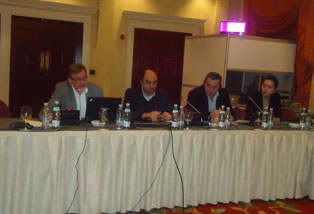Tamta Beliashvili
On February 29, the Human Rights Center and Oslo Coalition on Freedom of Religion and Belief presented a new website www.religiebi.info in the Hotel Tbilisi Marriott. The second part of the meeting was dedicated to the Seminar “New Amendments to the Civil Code about Registration: Expectations and Result.”
Various international organizations, members of the religious minorities and representatives of the Government of Georgia were invited to the meeting. The Public Defender of Georgia Giorgi Tugushi and Dag Nygard from the Oslo Coalition made speeches during the meeting.
All participants of the Seminar welcomed the introduced amendments to the Civil Code of Georgia. However, they noted that rapid adoption of the law caused spread of xenophobic statements, letters and articles by various media sources and online websites. It proved that the society was not ready for these changes.
Ucha Nanuashvili, the executive director of the Human Rights Center, said the most problem was created by lack of awareness of the society. “I personally met the people, who did not know what amendments were introduced to the Code. After studying the case, they realized that there was nothing significant. It is positive to introduce changes but they are not enough. Much more should be done in order to encourage minorities not to consider themselves as second-level society. We want more media and non-governmental organizations to be interested in the issue and it is the purpose of the new website.”
Nino Gvedashvili from the Human Rights House Tbilisi suggested the representatives of religious minorities to be open in their cooperation with media and asked question to the representatives of the government: “What privileges are granted to religious minorities after adoption of the law or is it only a formal changes without any real advantages for minorities?”
Expert of religious issues and historian Nugzar Papuashvili spoke about Orthodox Nationalism. “During many years the [Georgian] population has been brainwashed by orthodox nationalism. This ideology works on the state level; on the one hand it is proved by the article in the Constitution, which underlines particular merit of the Orthodox Church in the History of Georgia, and on the other hand by the Constitutional Agreement which is the Constitution in fact. The preamble of this Agreement legalizes the Orthodox Nationalism as a state ideology. It is eventually reinforced in the mentality of population which naturally causes the incidents which we have discussed. It is impossible to speak about equality of rights among citizens in the sense of religion.”
Nugzar Papuashvili raised another problem during the seminar – it is about conduct of religious services in penitentiary institutions by the clergymen of various confessions. He said the Orthodox Church enjoys the ultimate right to enter custodies while others other face certain barriers when entering the prisons and they can conduct religious services only after set of documents are submitted to the penitentiary department.
The Public Defender stated that before the amendments were introduced to the Code, the clergymen of other confessions needed notification from the Patriarchate to enter the custodies; but now they do not need similar notifications. However, official documents must be submitted to the Penitentiary Department.
Baia Pataraia from the Ministry of Justice spoke about the Concordat and clarified why this Constitutional Agreement was signed only with the Orthodox Church of Georgia and not with other confessions. She said the decision relied on the historical links between the state and this confession.
“The Constitution of the independent Georgia clarifies that the state shall declare complete freedom of belief and religion, as well as shall recognize the special role of the Apostle Autocephalous Orthodox Church of Georgia in the history of Georgia and its independence from the state,” Baia Pataraia said.
Malkhaz Nardindoshvili from the National Security Council said it was significant for religious minorities to receive status of public law legal entity. He said the introduced amendments had political purpose – the state admitted that they care about religious minorities, about solution of their problems and equality rights.
At the end of the meeting, Ucha Nanuashvili thanked to the participants and underscored particular importance of the issue of religious minorities. He said, hopefully http://www.religiebi.info/ will assist the society to have more information about the problems of minority groups.




